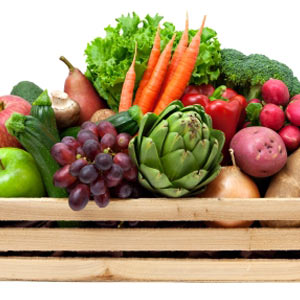
In 2008 the University of Copenhagen published a study in the Journal of the Science of Food and Agriculture which found that organic foods contained no more nutrients than non-organic foods grown with the use of pesticides.
The research team, led by Dr Susanne Bügel, studied five different crops (carrots, kale, mature peas, apples and potatoes) which were cultivated both organically (without pesticides) and conventionally (with the use of pesticides) and found that there was no higher level of trace elements in the food grown organically.
"No systematic differences between cultivation systems representing organic and conventional production methods were found across the five crops so the study does not support the belief that organically grown foodstuffs generally contain more major and trace elements than conventionally grown foodstuffs,” Bügel said.
Nutrition experts from the Harvard Medical School confirmed with similar studies that organic foods contained the same nutrients as non-organic food – and in the same amounts.
“There is no solid evidence that organic foods in general are healthier for humans. The only advantage of organic foods is that they contain little, if any, pesticides or herbicides,” the Harvard team reported. “The only exception is organically raised meat which may prevent the spread of diseases such as mad cow disease,” they said.
Conventionally raised livestock can catch this disease by eating the meat or bones of infected animals. But because animals sold as organic meat do not eat slaughtered animals, they are unlikely to catch mad cow disease.
Perhaps the most common concern about conventionally grown foods is the fear of ingesting pesticides and what effect this might have on health. However, the level of pesticides found in conventionally grown foods hasn’t been definitely linked to any health risk, Harvard Medical School reports.
Going organic - a more nutritious option?
An EU-funded study by British scientists, however, has found that some organic foods, including fruit, vegetables and milk, may very well be more nutritious than non-organic produce.
"The organically grown fruits and vegetables contained 'up to 40%' more antioxidants than the non-organic varieties," the study leader Dr Leifert, Professor of Ecological Agriculture at Newcastle University and head of Tesco Centre for Organic Agriculture, reported in 2008.
Another study published in the Alternative Therapy Health and Medicine journal found that organic food also contained more ascorbic acid, more protein and fewer nitrates than food that was conventionally grown.
The researchers found that the reason why organic foods have more nutrients is that they contain less water. “The higher water content of conventionally raised crops causes a nutrient dilution, which isn't present in organic crops.”
Organic supporters also say that the artificial fertilisers used in conventional farming, actually reduce the capacity of fruits and vegetables to absorb trace elements and this lowers the nutritional value.
The UK Soil Association argues that organic farming is overall better for tackling climate change than industrial agricultural methods. "As well as lower average energy use, organic farming also avoids the very large nitrous oxide emissions from fertilizer manufacture." Additionally, organic farming builds up soil carbon, removing it from the atmosphere. It also supports more local food marketing, reducing food miles, the Association argues.
A study published in the American Journal of Agricultural and Food Chemistry found that fresh fruit and vegetables that are not treated with chemical pesticides may contain up to 60% more flavonoids (cancer fighting phytochemicals, which are also antioxidants).
Flavonoids protect the plant from outside stresses like pests and ultraviolet radiation. If the plant is sprayed with a pesticide, the levels of natural flavonoids are lowered.
The Harvard Medical School, though, found that both organic and non-organic foods could contain cancer-causing properties.
Not every organic product is healthy
It is important to remember that not every product with an organic origin is necessarily healthy.
Take coffee for example. Both organic and non-organic coffee contains caffeine and caffeine increases one's blood pressure. It also affects blood glucose levels and, as a mild laxative, it can affect the absorption of B vitamins in the colon. Caffeine is also a diuretic that can cause mild dehydration.
Organic cheese, like normal cheese, is high in saturated fats and organic chocolate still contains unhealthy sugars and fats.
So what are we to do?
Until more conclusive evidence emerges, the decision to buy organic comes down to personal choice: if you like the idea of eating foods made without chemicals or pesticides, buy organic. Otherwise, it’s good to know that eating conventionally grown fruits and vegetables is also a healthy choice.
Read food labels and base your choice on the nutritional value of the food. Whether or not you buy organic, don’t let concerns over pesticides deter you from eating plenty of fruits and vegetables.
The bottom line is that the health benefits from eating fruits and vegetables outweigh the risks from ingesting the pesticides on them.
(Health24, October 2010)
(Sources: www.CNN.com/technology, www.Guardian.co.uk, Harvard Health Publications - HealthBeat, EurekAlert)




 Publications
Publications
 Partners
Partners













